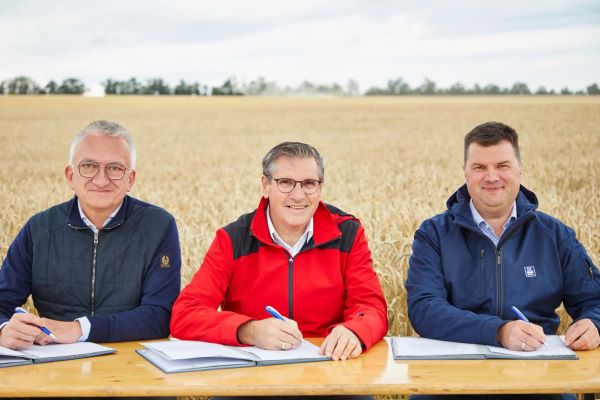Yara Germany, all nine locations of the Bindewald & Gutting Milling Group, and Harry-Brot signed a cooperation agreement with the shared goal of reducing CO2 emissions in cereal production

Signing the agreement: Michael Gutting, Managing Partner of Bindewald & Gutting Mill Group;Norbert Lötz, Managing Director for Production and Technology at Harry-Brot; and Marco Fleischmann, Managing Director of Yara Germany.
Yara Germany, the Bindewald & Gutting Milling Group and Harry-Brot signed a cooperation agreement aimed at decarbonizing cereal cultivation in Germany through the use of green fertilizers. For this purpose, Norwegian ammonia produced with hydropower will be processed in Rostock.
As early as of 2023/24 growing season, contract farmers of the Bindewald & Gutting Milling Group will use Yara’s green fertilizer on an area of around 1,600 ha. The fertilizer will be produced from green ammonia at Yara's plant in Rostock, Germany.
Unlike traditional methods that use fossil fuels like natural gas for ammonia extraction, green ammonia is produced using renewable energy sources such as wind, hydropower, or solar energy. This process involves obtaining the necessary hydrogen for ammonia synthesis through electrolysis. The outcome is a fertilizer with up to 90% reduced CO2 footprint, compared to conventional methods.
In this context, Yara Germany, all nine locations of the Bindewald & Gutting Milling Group, and Harry-Brot signed a cooperation agreement with the shared goal of reducing CO2 emissions in cereal production. The partnership will help in reducing carbon footprint along the entire food value chain, starting from fertilizers to sales and ultimately reaching end consumers.
Benoît Lamaison, SVP of the Continental Europe Business Unit, welcomed the cooperation with the Bindewald & Gutting Milling Group and Harry-Brot: "Today's signing of our cooperation agreement officially kicks off the first project in Germany using Yara's green fertilizer solution based on fossil-free ammonia. We are looking forward to the cooperation and hope this is the first of many partnerships across the entire food value chain."
"Our partnership with the Bindewald & Gutting Milling Group and Harry-Brot is a crucial first step to decarbonize German agriculture. It is a concrete example of how food production can be transformed in a sustainable way. However, not only all stakeholders along the food value chain are challenged and invited to actively participate in the green transformation of agriculture but also politicians promoting the expansion of renewable energies," adds Marco Fleischmann, Managing Director of Yara Germany.
"The avoidance and reduction of greenhouse gas emissions in all scopes is at the core of our sustainability strategy. While we are continuously working on reducing Scopes 1 and 2 CO2 emissions, with short delivery and transport routes and efficient production, we are still dependent on agriculture and our suppliers when it comes to Scope 3 emissions. If we succeed, starting with fertilization, we can reduce emissions precisely where a large proportion of our supply chain emissions has always occurred. This is why we are proud to be part of this innovative project," explains Norbert Lötz, Managing Director for Production and Technology at Harry-Brot.
The partners are looking forward to the close cooperation and are hoping for a pull effect in the sector, so that the joint approach to reduce the CO2 footprint in cereal cultivation is replicated by other players as well.
Subscribe to our newsletter & stay updated.